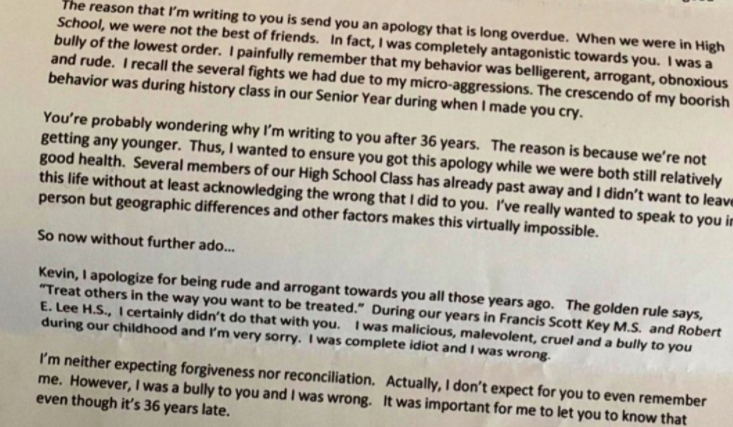"I was a bully to you and I was wrong" - Bully apologises to victim after 36 years
Updated | By Scenic Drive With Rian
A bully has written a letter of apology to the person he bullied in high school.

Bullying is a major problem all over the world.
According to bullying.co.za, 57% of South African learners have been bullied at some point during their high school careers.
Earlier this week, a letter went viral on social media of a bully apologising to its victim after 36 years.
READ: Breakfast with Martin Bester discusses bullying facts, prevention, and effects
The bully decided to apologise as it has been "long overdue".
"I was a bully of the lowest order. I painfully remember that my behaviour was belligerent, arrogant, obnoxious, and rude," the bully wrote.
The bully continued by saying that he didn't want to leave this life without at least acknowledging the wrong he did.
READ: How to tell if your child is being bullied
"I apologize for being rude and arrogant towards you for all those years. I was malicious, malevolent, cruel, and a bully to you during our childhood and I'm very sorry. I was a complete idiot and I was wrong."
The bully acknowledged the fact that he is not expecting forgiveness nor reconciliation.
"Actually, I don't expect you to remember me. However, I was your bully and I was wrong. It was important for me to let you know that even though it's 36 years later."
A high school bully apologizes... it's never too late to say sorry 🙌 pic.twitter.com/e7gIhwt1wP
— GoodNewsCorrespondent (@GoodNewsCorres1) July 18, 2021
There are different types of bullying - verbal, social, physical, and cyber. There are also several signs that can show you if your child is being bullied.
Your child could develop emotional and behavioural changes such as:
- Sudden drop in grades or loss of interest in going to school.
- Not wanting to use the same school transport he/she has been using.
- Faking illness in the morning.
- Having nightmares, wetting the bed or changes in sleep patterns.
- The loss of appetite or changes in eating patterns, or even coming back home hungry.
- Anger, mood swings or refusing to talk about what is wrong.
- Targeting siblings.
- Coming home with missing or damaged belongings or clothes.
- Appearing insecure or frightened.
- There could also be physical signs that show that your child is being bullied. These can include unexplained bruises, cuts, scratches.
How to get help for your child
- It is important to talk to your child and to win his or her trust so that they can open up to you about what is really going on. Make your child understand that it is not their fault that they are being bullied and assure them of your love for them.
- Report the bullying at your child’s school. Many schools have anti-bullying policies and they will deal with the matter.
- Get professional help. Bullying can damage your child’s self-esteem and affect their emotional well-being. It is important that you get them to speak to a professional.
Tune in to the 'Scenic Drive with Rian', weekdays from 16:00-19:00. Stream the show live here or download our mobile app here.
Image Credit: Twitter/ Good News Correspondent
Show's Stories
-
LISTEN: Widow's new partner upset about old wedding ring
There is no one-size-fits-all when it comes to navigating grief.
The Drive with Rob & Roz 8 hours ago -
WATCH: Wimbledon champion shares sweet moment with young royals
Which is rarer: meeting a Wimbledon winner or a British Royal family mem...
The Drive with Rob & Roz 8 hours ago